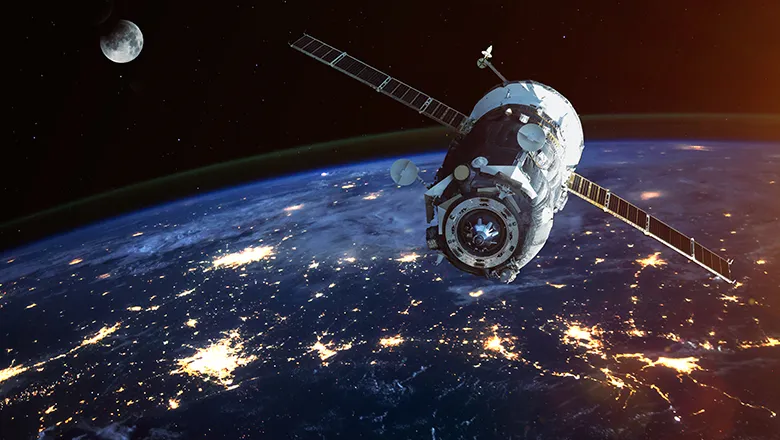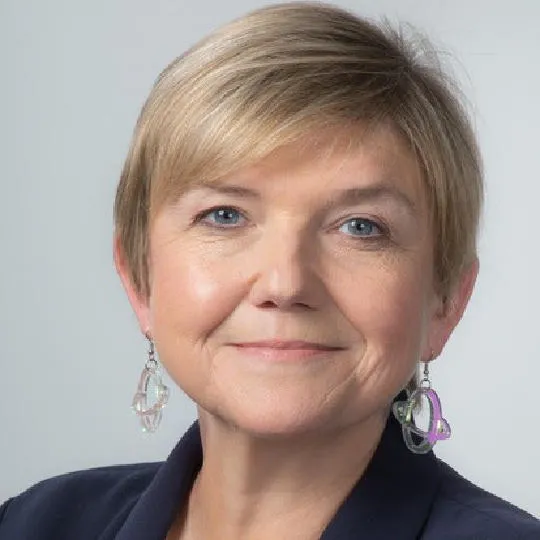During the Cold War, 93% of space launches were made by the United States and the USSR. Now the majority are by other nations, and in fact 90% of launches are commercial, so it's a completely different sort of situation now, and over 70 countries have space programmes.
Dr Sophy Antrobus, Research Associate at the Freeman Air and Space Institute
24 March 2022
The important role of space in modern-day warfare
The invasion of Ukraine has shown how new technologies are now used alongside more traditional means of waging war. This new podcast episode explores how space has developed since the Cold War to become integral part of military and security operations today.

In recent decades, space has developed to become a key element of military and security operations, creating new opportunities and challenges for defence and intelligence communities.
This new episode, which is part of the WORLD: we got this podcast series, looks at how countries around the world and private individuals are expanding their activities into space and how closely these are linked to what is happening on Earth.
It also explores whether we need to put in safeguards now, how we can learn lessons from the past and why we should encourage international collaboration to ensure space doesn’t become dangerous overcrowded by satellites and space debris.
The episode feature Dr Sophy Antrobus, Dr Mark Hilborne and Julia Balm, who are all based in the School of Security Studies in our Faculty of Social Science & Public Policy.
They explain how at least 90 percent of the UK’s military capabilities are reliant on space in some way, such as through Position, Navigation and Timing (PNT) signals from satellites orbiting Earth.
Dr Mark Hilborne says dependence on space applies particularly to the American military because the USA has invested the most in space and so depends on it more than any other nation.
However countries all around the world and private individuals are now operating in space, which is a huge change from the past.
They discuss how China is increasingly interested in space for the same reasons as other countries around the world, including the fact today's space economy is worth close to half a trillion dollars. The UK has also recently published its first Defence Space Strategy along with a £1.4 billion investment, that our experts say shows a cohesive direction for Britain on space.
Another significant change from the past is the way the public can now see information from space themselves, such as the satellite images of troop movements in the Ukraine war. We have also seen companies such as Google making decisions on traffic data or SpaceX providing internet access to Ukrainians, that could directly affect the conflict.
It's interesting to think about how the high degrees of secrecy that once shrouded Cold War space-based assets no longer exists today, where today's unclassified open information, and particularly satellite imagery, allows analysts to identify troop movements, reveal the deployment of military equipment, and track the real time evolution of conflict.
Julia Balm, PhD candidate at the Freeman Air and Space Institute and Department of War Studies
All our experts warn that, alongside the advantages space offers, it also create a whole new range of vulnerabilities, some of which relate to increasing congestion in space. In 2015 there were 1200 satellites, and this increased by 50 percent by 2018 and it is even predicted there could be 60,000 within the next decade. A key concern is the proliferation of orbital debris and how it could have an irreversible impact on the space environment.
They highlight how space domain or situational awareness is a crucial aspect to coping with increasing congestion in space, putting people today in a similar position to those just after the First World War who developed air traffic control systems to deal with the rapid growth of aviation.
They also say there are ongoing discussions around greater regulation, what responsible behaviour looks like, and improving our understanding of what is happening in space.
Looking to the future, they predict that wars will still be determined by what is happening on the ground, which means conflicts or alliances on Earth will directly affect what happens in space.
Tensions on Earth will be reflected in space. Space is not decoupled in that way. Where there's terrestrial tensions, there will be astro tensions. It's something very interconnected to what we do here on Earth.
Dr Mark Hilborne, Lecturer in the Defence Studies Department and founder of the Space Security Research Group



